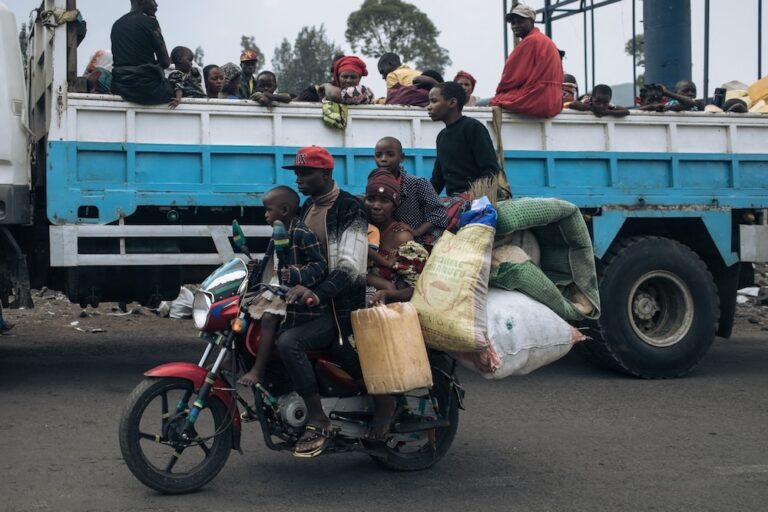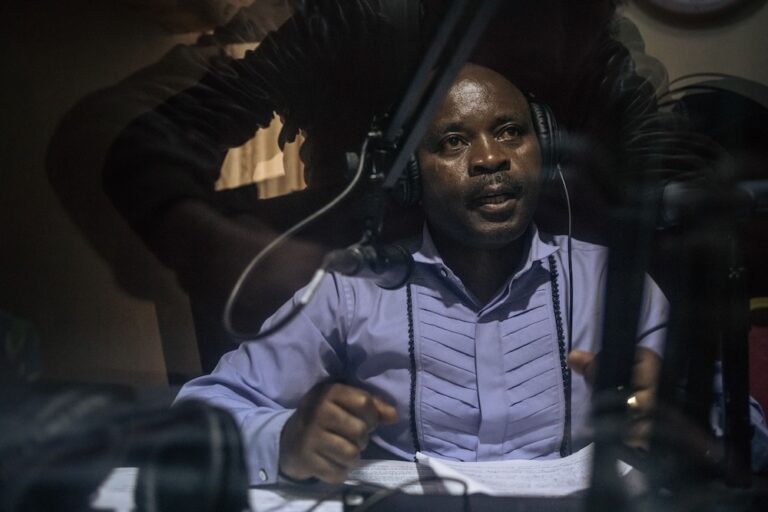(JED/IFEX) – The following is a 4 August 2006 JED press release: Elections in DRC: JED calls for strict respect for press freedom by all Kinshasa, 4 August 2006 JED, an independent and non-profit organisation for the defense and promotion of press freedom and the alert network for the Central African Media Organisation (Organisation des […]
(JED/IFEX) – The following is a 4 August 2006 JED press release:
Elections in DRC: JED calls for strict respect for press freedom by all
Kinshasa, 4 August 2006
JED, an independent and non-profit organisation for the defense and promotion of press freedom and the alert network for the Central African Media Organisation (Organisation des Medias d’Afrique Centrale, OMAC), is carefully monitoring the media coverage of the electoral process, especially that of the 30 July 2006 polls and the compilation of results.
JED is particularly concerned by the growing number of reactions, warnings and the occasional insults and threats made against media outlets. The latter are accused, sometimes with evidence, of falsifying the vote-count figures or of wanting to publish results ahead of and in place of the Independent Electoral Commission (IEC) and ultimately the Supreme Justice Court.
In a 2 August joint press release, the IEC and the High Authority of the Media (Haute Autorité des Médias, HAM) condemned those media outlets, without naming them, who have engaged in “flagrant violation of the electoral law related to the publication of results . . . by a premature proclamation of results that disrupts the electoral process and creates a useless and dangerous climate of tension. . . .” These two institutions have warned the radio and television stations concerned that they could face severe sanctions, including being shut down in the case of a second offence.
Similarly, the 3 August press release of the International Committee Accompanying the Transition (Comité International d’Accompagnement de la Transition, CIAT) expressed concern at the “excessive politicisation by Congolese political actors of the process of compiling voting results . . . and by the media, who relay and amplify this phenomenon by bombarding the people with wide-ranging figures.” CIAT reminded the media that “they bear a heavy responsibility before the people, the law and history, and that any incitement to hatred and violence are liable to sanctions by the law.”
Facing this crossfire against the media, some of which is well-founded, JED is speaking out against the apparent attempt to present the media as the ones responsible if things eventually get out of control. While congratulating all the transitional bodies for the important role they played in organising elections in the DRC, JED calls for all to note the following observations:
1. There cannot be any real transparency in the electoral operations that are underway, unless the media are provided with the possibility of informing the public freely, honestly and responsibly about the various events surrounding the elections. It is this concern for transparency, in our opinion, that justifies the accreditations granted to journalists from the national as well as international press to gain access to voting offices and even attend the counting operations.
2. This shared concern for transparency prompted the legislature to include in the electoral law an obligation for all voting offices to post the vote results outside their offices immediately after the vote count, in order to make them accessible to the public, notably through the media.
3. The gathering of this data, its publication and even the analysis of the trends that emerge, in accordance with journalistic rules and ethics, are normal practices for every free press in all the world’s democracies. They can under no circumstances be considered an incitement of the population to revolt.
4. The entire international community, as well as all the international observers, praised the “political maturity of the Congolese people,” who proved their sense of responsibility by voting in overwhelming numbers on 30 July. Therefore, they ought not to be anxious about the capacity of the same Congolese people to make a clear distinction between the “information” and “intoxication” published in different media.
5. JED stresses to media professionals and the organisations responsible for regulation and self-regulation of the press that no trustworthy professional can allow himself or herself, whatever his or her media outlet’s editorial line, to intentionally falsify the data collected from voting offices or to give false news in an attempt to serve a partisan cause.
6. JED also noted the abusive and sometimes dishonest exploitation by journalists of partial results collected from various voting offices. JED strongly condemns these practices, which are the very negation of journalism, and urges competent authorities to denounce them by name and sanction them adequately to avoid the press as a whole being discredited and journalists’ safety thereby being endangered.
With regard to the preceding points, JED rises up against the attempt to turn Congolese journalists into scapegoats for the failures and deceptions of politicians. JED appeals for all to respect press freedom, understood as the right for journalists to search for news – all the news – and to be able to deal with it and distribute it without restriction. This also includes the public’s right to be fully informed, in accordance with professional rules, on all issues of national interest. JED notes that no special measures can encroach upon press freedom as guaranteed by the country’s constitution and by international legal instruments to which the DR Congo is a party.
Tshivis T. Tshivuad
Secretary-General
D. M’Baya Tshimanga
President


